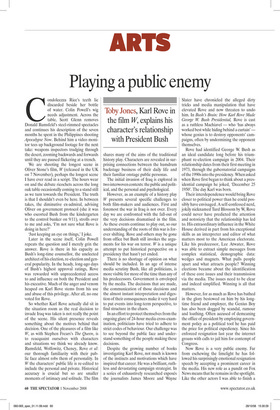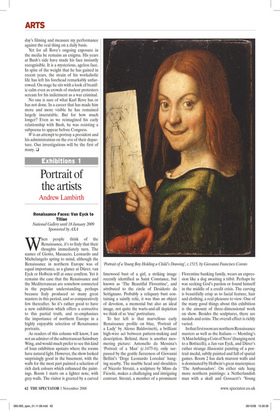Playing a public enemy
Toby Jones, Karl Rove in the film W, explains his character’s relationship with President Bush Condoleezza Rice’s teeth lie discarded beside her bottle of water. Colin Powell’s wig needs adjustment. Across the table, Scott Glenn removes Donald Rumsfeld’s steel-rimmed spectacles and continues his description of the seven months he spent in the Philippines shooting Apocalypse Now. Behind him a video monitor tees up background footage for the next take: weapons inspectors trudging through the desert, zooming backwards and forwards until they are paused flickering at a trench.
We are shooting the longest scene in Oliver Stone’s film, W (released in the UK on 7 November), perhaps the longest scene I have ever read in a script. The hours wear on and the debate ricochets across the long oak table occasionally coming to a stand still as we turn towards the President. The truth is that I shouldn’t even be here. In between takes, the diminutive ex-admiral, advising Oliver on government protocol (she it was who escorted Bush from the kindergarten to the control bunker on 9/11), strolls over to me and asks, ‘I’m not sure what Rove is doing in here?’ ‘Just keeping an eye on things,’ I joke.
Later in the scene itself, Colin Powell repeats the question and I merely grin the answer. Rove is there in his capacity as Bush’s long-time counsellor, the unelected architect of his election, re-election and general popularity. In the heady, long-ago days of Bush’s highest approval ratings, Rove was rewarded with unprecedented access to and influence on both the President and his executive. Much of the anger and venom heaped on Karl Rove stems from his use and abuse of this privilege. After all, no one voted for Rove.
So whether Karl Rove actually did sit in the situation room as the real decision to invade Iraq was taken is not really the point of the scene. His silent presence reveals something about the motives behind that decision. One of the pleasures of a film like W, as with Stephen Frears’s The Queen, is to reacquaint ourselves with characters and situations we think we already know. Rumsfeld, Wolfowitz, Cheney, Rove et al: our thorough familiarity with their public face almost robs them of personality. In W the characters’ public life is re-edited to include the personal and private. Historical accuracy is crucial but so are smaller moments of intimacy and solitude. The film shares many of the aims of the traditional history play. Characters are revealed in surprising connections between the humdrum backstage business of their daily life and their familiar onstage public personas.
The initial invasion of Iraq is explored in two interwoven contexts: the public and political, and the personal and psychological.
However, as an example of a history play W presents several specific challenges to both film-makers and audiences. First and foremost the war in Iraq is not over. Every day we are confronted with the fall-out of the very decisions dramatised in the film. As these events continue to play out, so our understanding of the roots of this war is forever shifting. Rove and others may be gone from office but Bush still invokes the arguments for his war on terror. W is a unique attempt to put historical perspective on a presidency that hasn’t yet ended.
There is no shortage of opinion on what should be included. In an age of intense media scrutiny Bush, like all politicians, is more visible for more of the time than any of his predecessors. Government is enveloped by the media. The decisions that are made, the communication of those decisions and the almost instant interpretation and digestion of their consequences make it very hard to put events into long-term perspective, to find structure in the chaos.
In an effort to protect themselves from the ongoing glare of 24-hour media cross-examination, politicians have tried to adhere to strict codes of behaviour. Our challenge was to see beyond the public face and understand something of the people making these decisions.
Despite the growing number of books investigating Karl Rove, not much is known of the instincts and motivations which have inspired that career. He was a brilliant, ruthless and devastating campaign strategist. In a series of exhaustively researched exposés the journalists James Moore and Wayne Slater have chronicled the alleged dirty tricks and media manipulation that have elevated Rove and now threaten to undo him. In Bush’s Brain: How Karl Rove Made George W. Bush Presidential, Rove is cast as a ruthless Machiavel — who ‘has always worked best while hiding behind a curtain’ — whose genius is to destroy opponents’ campaigns, often by undermining the opponent themselves.
Rove had identified George W. Bush as an ideal candidate long before his triumphant re-election campaign in 2004. Their relationship dates from their first meeting in 1973, through the gubernatorial campaigns of the 1990s into the presidency. When asked when Rove first began to think about a presidential campaign he joked, ‘December 25 1950’. The day Karl was born.
Their interdependence would bring Rove closer to political power than he could possibly have envisaged. A self-confessed nerd, jokily nicknamed Turd Blossom by W, Rove could never have predicted the attention and notoriety that the relationship has led to. His extraordinary influence in the White House derived in part from his exceptional skills as an interpreter and editor of what matters most to the American electorate. Like his predecessor, Lee Atwater, Rove was able to extract simple messages from complex statistical, demographic data: wedges and magnets. What pulls people apart and what attracts people? Winning elections became about the identification of these core issues and their transmission via the media. The issues need to be clear and indeed simplified. Winning is all that matters.
However, for as much as Rove has bathed in the glory bestowed on him by his longtime friend and employer, the Genius Boy has also been dogged by scandal, rumour and loathing. Often accused of demeaning the office of president by employing government policy as a political tool he has paid the price for political expediency. Since his enforced resignation last year the internet groans with calls to jail him for contempt of Congress.
Now Rove is a very public enemy. Far from eschewing the limelight he has followed his surprisingly emotional resignation speech by accepting a prominent career in the media. His new role as a pundit on Fox News means that he remains in the spotlight. Like the other actors I was able to finish a day’s filming and measure my performance against the real thing on a daily basis.
Yet for all Rove’s ongoing exposure in the media he remains an enigma. His years at Bush’s side have made his face instantly recognisible. It is a mysterious, ageless face. In spite of the weight that he has gained in recent years, the strain of his workaholic life has left his forehead remarkably unfurrowed. On stage he sits with a look of beatific calm even as crowds of student protesters scream for his indictment as a war criminal.
No one is sure of what Karl Rove has or has not done. In a career that has made him more and more visible he has remained largely inscrutable. But for how much longer? Even as we reimagined his early relationship with Bush, he was resisting a subpoena to appear before Congress.
W is an attempt to portray a president and his administration on the eve of their departure. Our investigations will be the first of many. ❑



































































































 Previous page
Previous page